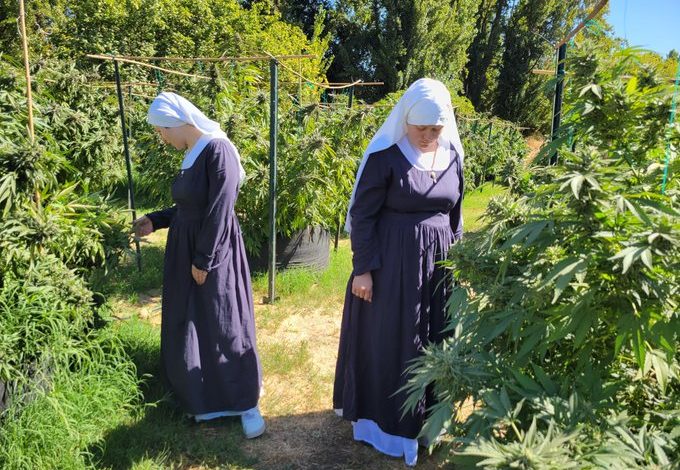Mexico’s Weed ‘Nuns’ Strive to Reclaim Plant from Narcos

In the moonlit outskirts of a village in central Mexico, a group of women clad in nun habits gathers beneath the full moon to celebrate a unique ritual. This assembly, known as the Sisters of the Valley, is not affiliated with any traditional religion but is committed to spreading the healing properties of cannabis.
Founded in 2014, the Sisters of the Valley, with monikers like “Sister Kika” and “Sister Bernardet,” have gained recognition for their unconventional approach to promoting cannabis. In the United States, where recreational marijuana is legal in numerous states, they have successfully operated a business, generating over $500,000 in revenue last year by selling CBD tinctures, oils, and salves online.
However, in Mexico, where a persistent drug war has left an indelible mark, the image of marijuana-smoking nuns is seen as an act of rebellion. The country’s deep-rooted Christian values further complicate their mission. Despite their presence on social media platforms, their product sales in Mexico remain modest at around $10,000 annually.
The Sisters, numbering five in total, operate discreetly due to the legal ambiguity surrounding cannabis in Mexico and its association with criminal organizations. Fearing potential threats or extortion, they carefully conceal the location of their operations.
One of the Sisters, using the pseudonym “Sister Bernardet,” emphasized their unique struggle in Mexico, stating, “The Sisterhood is in a totally different context here in Mexico – because of how religious the country is and because of the plant’s ties to cartels. We want to take the plant back from the narcos.”
The Sisters model themselves after the Beguines, a lay religious movement from the Middle Ages. In Mexico, guided by Alehli Paz, a chemist and marijuana researcher, they cultivate a modest cannabis crop in a concealed location.
Despite facing tensions within their families due to the conservative nature of Mexican society, the Sisters engage in activism. They participate in workshops promoting cannabis legalization, create cannabinoid salves, and work towards demystifying the chemistry of the plant.
In a country with a predominantly Catholic population, the Sisters argue that the war on drugs has been counterproductive, resulting in widespread violence and mass incarceration. The Sisters’ efforts aim to change perceptions and contribute to a larger movement advocating for cannabis legalization.
The story reflects the complex intersection of cultural, religious, and legal factors as the Sisters of the Valley endeavor to challenge stereotypes and reclaim the cannabis plant from its association with criminal elements in Mexico.





